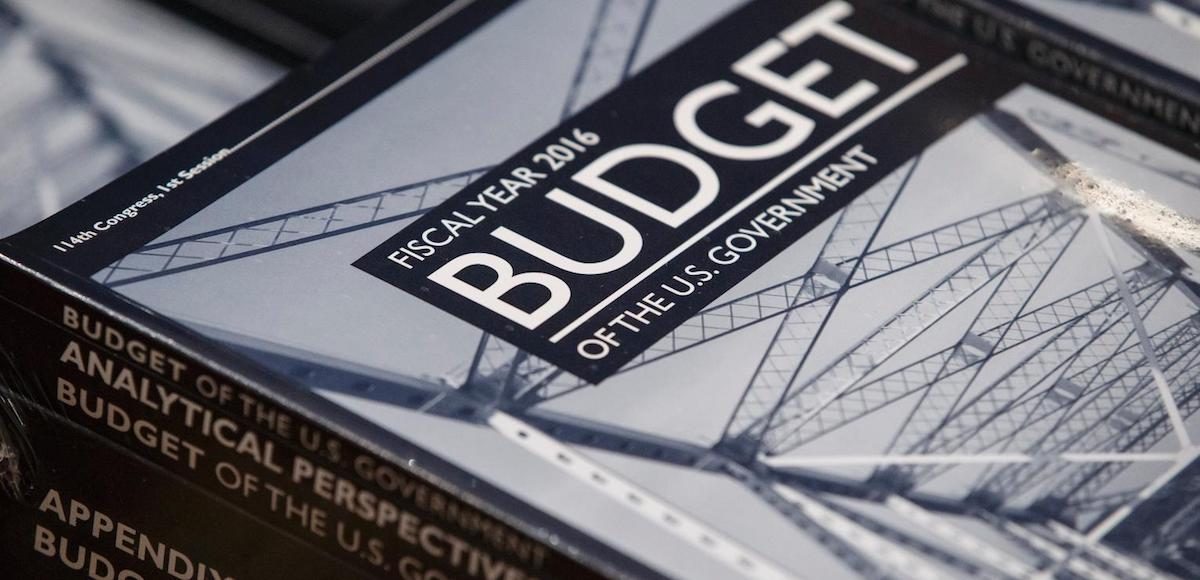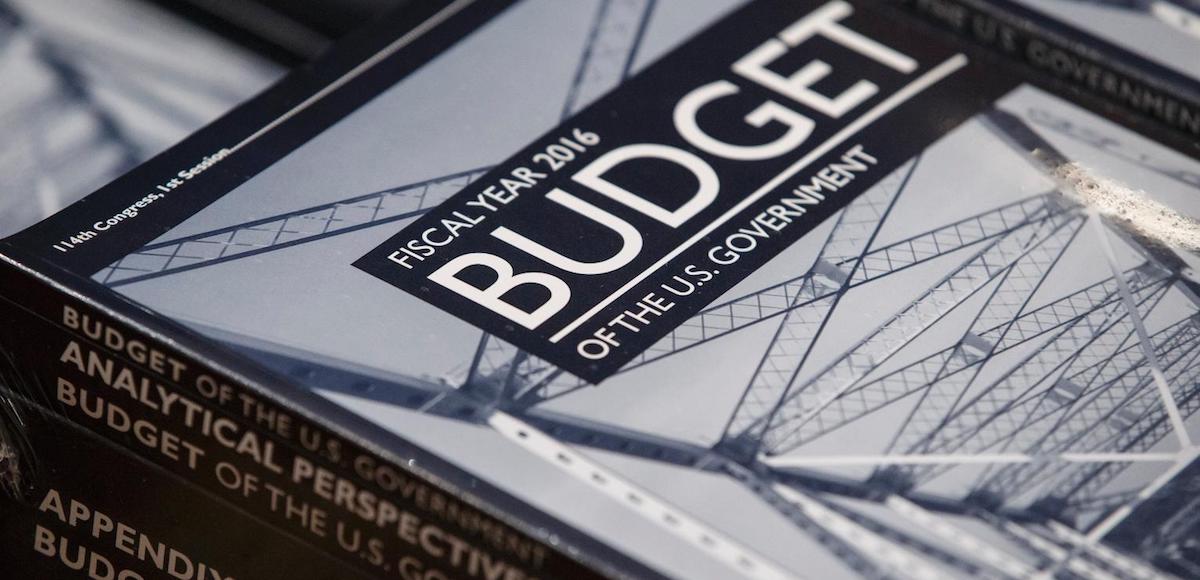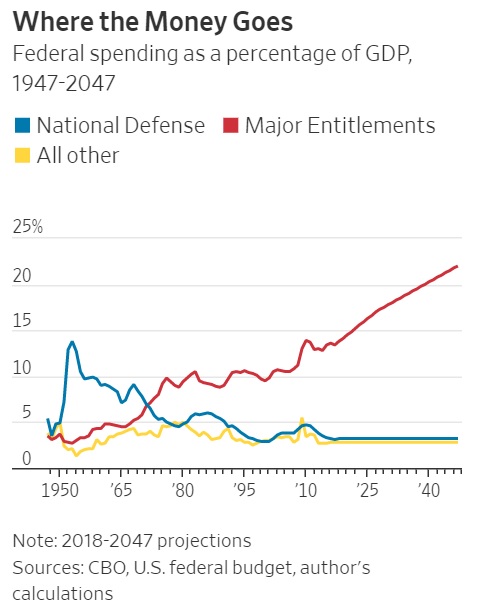

File: The $4 trillion U.S. federal budget proposed by Barack Obama in 2016. (Photo: Reuters)
Writing about federal spending last week, I shared five charts illustrating how the process works and what’s causing America’s fiscal problems.
Most important, I showed that the ever-increasing burden of federal spending is almost entirely the result of domestic spending increasing much faster than what would be needed to keep pace with inflation.

And when I further sliced and diced the numbers, I showed that outlays for entitlements (programs such as Social Security, Medicare, Medicaid, and ObamaCare) were the real problem.
Let’s elaborate.
John Cogan, writing for the Wall Street Journal, summarizes our current predicament.
Since the end of World War II, federal tax revenue has grown 15% faster than national income—while federal spending has grown 50% faster. …all—yes, all—of the increase in federal spending relative to GDP over the past seven decades is attributable to entitlement spending. Since the late 1940s, entitlement claims on the nation’s output of goods and services have risen from less than 4% to 14%. …If you’re seeking the reason for the federal government’s chronic budget deficits and crushing national debt, look no further than entitlement programs. …entitlement spending accounts for nearly two-thirds of federal spending. …What about the future? Social Security and Medicare expenditures are accelerating now that baby boomers have begun to collect their government-financed retirement and health-care benefits. If left unchecked, these programs will push government spending to levels never seen during peacetime. Financing this spending will require either record levels of taxation or debt.
Here’s a chart from his column. Only instead of looking at inflation-adjusted growth of past spending, he looks at what will happen to future entitlement spending, measured as a share of economic output.

And he concludes with a very dismal point.
…restraint is not possible without presidential leadership. Unfortunately, President Trump has failed to step up.
I largely agree. Trump has nominally endorsed some reforms, but the White House hasn’t expended the slightest bit of effort to fix any of the entitlement programs.
Now let’s see what another expert has to say on the topic. Brian Riedl of the Manhattan Institute paints a rather gloomy picture in an article for National Review.
…the $82 trillion avalanche of Social Security and Medicare deficits that will come over the next three decades elicits a collective shrug. Future historians — and taxpayers — are unlikely to forgive our casual indifference to what has been called “the most predictable economic crisis in history.” …Between 2008 and 2030, 74 million Americans born between 1946 and 1964 — or 10,000 per day — will retire into Social Security and Medicare. And despite trust-fund accounting games, all spending will be financed by current taxpayers. That was all right in 1960, when five workers supported each retiree. The ratio has since fallen below three-to-one today, on its way to two-to-one by the 2030s. …These demographic challenges are worsened by rising health-care costs and repeated benefit expansions from Congress. Today’s typical retiring couple has paid $140,000 into Medicare and will receive $420,000 in benefits (in net present value)… Most Social Security recipients also come out ahead. In other words, seniors are not merely getting back what they paid in. …the spending avalanche has already begun. Since 2008 — when the first Baby Boomers qualified for early retirement — Social Security and Medicare have accounted for 72 percent of all inflation-adjusted federal-spending growth (with other health entitlements responsible for the rest). …
Brian speculates on what will happen if politicians kick the can down the road.
…something has to give. Will it be responsible policy changes now, or a Greek-style crisis of debt and taxes later? …Restructuring cannot wait. Every year of delay sees 4 million more Baby Boomers retire and get locked into benefits that will be difficult to alter… Unless Washington reins in Social Security and Medicare, no tax cuts can be sustained over the long run. Ultimately, the math always wins. …Frédéric Bastiat long ago observed that “government is the great fiction through which everybody endeavors to live at the expense of everybody else.” Reality will soon fall like an anvil on Generation X and Millennials, as they find themselves on the wrong side of the largest intergenerational wealth transfer in world history.
Not exactly a cause for optimism!
Last but not least, Charles Hughes writes on the looming entitlement crisis for E21.
Medicare and Social Security already account for roughly two-fifths of all federal outlays, and they will account for a growing share of the federal budget over the coming decade. …Entitlement spending growth is a major reason that budget deficits are projected to surge over the next decade. …The unsustainable nature of these programs face mean that some reforms will have to be implemented: the only questions are when and what kind of changes will be made. The longer these reforms are put off, the inevitable changes will by necessity be larger and more abrupt. …Without real reform, the important task of placing entitlement programs back on a sustainable trajectory will be left for later generations—at which point the country will be farther down this unsustainable path.
By the way, it’s not just libertarians and conservatives who recognize there is a problem.
There have been several proposals from centrists and bipartisan groups to address the problem, such as the Simpson-Bowles plan, the Debt Reduction Task Force, and Obama’s Fiscal Commission.
For what it’s worth, I’m not a big fan of these initiatives since they include big tax increases. And oftentimes, they even propose the wrong kind of entitlement reform.
Heck, even folks on the left recognize there’s a problem. Paul Krugman correctly notes that America is facing a massive demographic shift that will lead to much higher levels of spending. And he admits that entitlement spending is driving the budget further into the red. That’s a welcome acknowledgement of reality.
A note on the folly of tax cuts. The US govt is an insurance company with an army; its expenses dominated by the elderly — and the ratio of >65 to working-age is rising sharply 1/ pic.twitter.com/AZA8ue0kBQ
— Paul Krugman (@paulkrugman) February 28, 2018
Sadly, he concludes that we should somehow fix this spending problem with tax hikes.
That hasn’t worked for Europe, though, so it’s silly to think that same tax-and-spend approach will work for the United States.
I’ll close by also offering some friendly criticism of conservatives and libertarians. If you read what Cogan, Riedl, and Hughes wrote, they all stated that entitlement programs were a problem in part because they would produce rising levels of red ink.
It’s certainly true that deficits and debt will increase in the absence of genuine entitlement reform, but what irks me about this rhetoric is that a focus on red ink might lead some people to conclude that rising levels of entitlements somehow wouldn’t be a problem if matched by big tax hikes.
Wrong. Tax-financed spending diverts resources from the private economy, just as debt-financed spending diverts resources from the private economy.
In other words, the real problem is spending, not how it’s financed.





